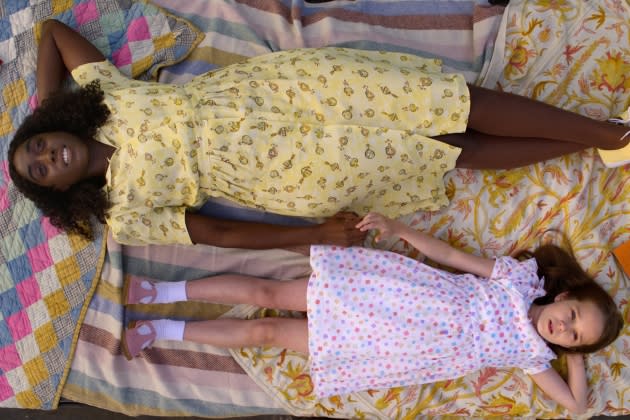London Film Festival Review: Matthew Warchus’ Opening-Night Movie ‘Roald Dahl’s Matilda The Musical’
- Oops!Something went wrong.Please try again later.
- Oops!Something went wrong.Please try again later.
- Oops!Something went wrong.Please try again later.

There are stories so good they can withstand any amount of retelling. Matilda began life as Roald Dahl’s rollicking tale of an outrageously spirited, clever little girl who defeats the bullying headmistress whose vocation is to make children miserable. The Royal Shakespeare Company turned it into a Christmas musical that burst the banks of the festive season, running for years and winning seven Olivier Awards in 2012 in London, then five Tonys the following year in New York. Now, director Matthew Warchus, along with writer Dennis Kelly and songwriter Tim Minchin, has directed the London Film Festival opener Roald Dahl’s Matilda the Musical for the screen. And once again, it is an absolute blast.
From the moment it begins, with a series of glowingly lit babies in cribs “singing” about how their besotted parents think they’re all geniuses, it is clear that Warchus and the team have not merely adapted the theater musical but rethought it, top to bottom. Clever staging gives way to visual extravagance. The maternity wing where the story starts is several servings brighter; Matilda’s home a couple of extra scoops more oppressively vulgar; and the school’s very own combat training course muddier and studded with more sharp, scary obstacles than anything you could imagine on your own. Just as a series of spectacles, it is hugely entertaining.
More from Deadline
Emma Thompson, Stephen Graham & Lashana Lynch On London Film Festival Opener ‘Matilda The Musical'
Emma Thompson Says 'Matilda The Musical' Child Stars Didn't Fear Her Terrifying Miss Trunchbull
Related Story
Emma Thompson, Stephen Graham & Lashana Lynch On London Film Festival Opener ‘Matilda The Musical'
Related Story
Emma Thompson Says 'Matilda The Musical' Child Stars Didn't Fear Her Terrifying Miss Trunchbull
Related Story
'Power Of The Dog' Producer Tanya Seghatchian To Lead London Film Festival Jury; Luc Besson & James Gray Booked For Rome's Talks Program; Banijay Completes Sony Germany Deal; Bert Habets Named ProSiebenSat.1 Media Group CEO; Neom To Host Asian Winter Games In 2029 — Global Briefs
Without exception, the actors leap across the same bar. Everyone is turned up to a glorious eleven. Emma Thompson’s Miss Trunchbull, the former hammer-throwing champion whose old skills come in handy when she picks up a girl by her braids and throws her over the fence, has more than a whiff of the Nazi camp commandant about her; even when she is screeching that she has a newt down her knickers, she is terrifying enough to send a satisfying shiver down the spine of the most ghoulish child in the audience.
Stephen Graham and Andrea Riseborough play Matilda’s parents, people who never wanted a baby, and despise the incisively intelligent girl that baby has become. Forever the stupidest, loudest kids in whatever class they failed, they romp around in terrible wigs, tearing up their daughter’s books and screaming with laughter at the television from their matching vinyl recliners, working their grotesque characters like a couple of music-hall comedians working to fill a stage.
There is plenty of this old-school showmanship in Matilda. Matilda herself makes up a story about an escapologist married to an acrobat that she tells in installments to the librarian Mrs Phelps, played with charming warmth by Sindhu Vee. The circus scenes are, of course, dazzling: production designers David Hindle and Christian Huband have seized every opportunity to run riot.
Mrs. Phelps and the class teacher Miss Honey, played by Lashana Lynch, are the twin saving graces of the adult world: kind, empathetic, imaginative and immediately aware that Matilda is no ordinary girl. True to the spirit of Dahl, however, being kind doesn’t mean being sweeter than the cheap chocolate Dahl himself loved so much. Miss Honey is a damaged, frightened woman whose love of teaching is a refuge from a hellish life in the outside world, much as books are for Matilda.
Matilda herself is not sweet at all. Clearly, if she were the sort of meek heroine who gets to marry a prince at the end of fairy tales, she would have crumbled in the face of parental neglect long ago. As it is, her rebel intelligence is kept sharp devising booby traps her parents are too dim-witted to shore home to her. Remarkably, they have found the perfect minx in Aisha Weir, whose gimlet gaze and composed resistance to Trunchbull’s bluster makes you believe that this girl really does have, as her classmates say, so many brains they are bursting out of her eyes. She is, as the kids sing of themselves in the closing song, a miracle.
Ah, the closing song, all about the value of rebellion and how small people, when they pull together, can be powerful: Trunchbull even gets de-statued, just to bring that theme right up to date. But all the songs!
Not to detract from anyone else’s good work, but Minchin’s spiky, precise numbers, their lyrics clear and lacerating even in the mass choruses, are key to Matilda’s enduring magic. As a scripted adaptation of Dahl’s story, Matilda in both its stage and screen versions would be poignant, pointed and fun. But with Minchin’s lyric lines as arabesques around the scenes, the constant surprises in his rhyming and the explosions of orchestration that give the big numbers such impact, it is something else. Does Tim Minchin have so many brains they’re coming out of the ends of his fingers? Anything seems possible.
Best of Deadline
James Bond Movies In Order: Filmography, Bond Women & Iconic Villains
The Royals And Politicians Of 'The Crown' And The Actors Who Play Them — Photo Gallery
Sign up for Deadline's Newsletter. For the latest news, follow us on Facebook, Twitter, and Instagram.

